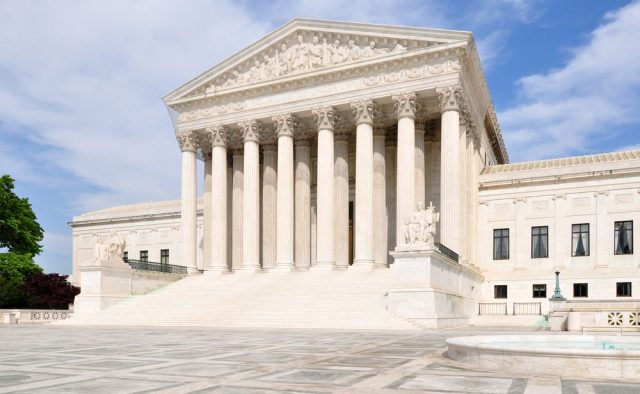 The U.S. Supreme Court decided Expressions Hair Design v. Schneiderman on Wednesday — a case that may hit New Yorkers in their wallet. Current New York State law prohibits merchants from passing along a surcharge to consumers paying with credit cards. What merchants can do, though, is offer customers a discount for paying in cash. The whole discount-but-not-surcharge thing wasn’t working for a bunch of businesses; they banded together and filed a 2013 lawsuit alleging that the New York law violated their right to freedom of speech. Weird as it sounds, this might not be a total stretch, because allowing merchants to charge what they want to charge has been protected before under the First Amendment. The retailers also claim that the law is too vague, which sounds like a winning argument to me, as this entire issue rests on the semantic difference between a “credit card surcharge” and a “cash discount.”
The U.S. Supreme Court decided Expressions Hair Design v. Schneiderman on Wednesday — a case that may hit New Yorkers in their wallet. Current New York State law prohibits merchants from passing along a surcharge to consumers paying with credit cards. What merchants can do, though, is offer customers a discount for paying in cash. The whole discount-but-not-surcharge thing wasn’t working for a bunch of businesses; they banded together and filed a 2013 lawsuit alleging that the New York law violated their right to freedom of speech. Weird as it sounds, this might not be a total stretch, because allowing merchants to charge what they want to charge has been protected before under the First Amendment. The retailers also claim that the law is too vague, which sounds like a winning argument to me, as this entire issue rests on the semantic difference between a “credit card surcharge” and a “cash discount.”
If anyone was expecting SCOTUS to send down a ruling that would have major First-Amendment meaning, they’d be pretty disappointed with the dud of a decision handed down by the Court yesterday. Chief Justice John Roberts wrote the opinion for the majority, and showed just how fantastic SCOTUS is at using surgical precision to answer only those questions it wants to answer.
Roberts explained that contrary to what New York State had argued, the law in question isn’t really a “price regulation.” Instead, Roberts said, §518 is really about communication of prices:
“Sellers are free to charge $10 for cash and $9.70, $10, $10.30, or any other amount for credit. What the law does regulate is how sellers may communicate their prices. A merchant who wants to charge $10 for cash and $10.30 for credit may not convey that price any way he pleases. He is not free to say ‘$10, with a 3% credit card surcharge’ or ‘$10, plus $0.30 for credit’ because both of those displays identify a single sticker price—$10—that is less than the amount credit card users will be charged. Instead, if the merchant wishes to post a single sticker price, he must display $10.30 as his sticker price.”
According to the Court, §518 is indeed a law that regulates speech. The group of plaintiff-merchants sure hoped SCOTUS might continue on and opine that §518 is an improper or unconstitutional regulation of speech – but that didn’t happen. Instead, the Court booted the entire case back down to the lower Circuit, reminding everyone that
“[W]e are a court of review, not of first view.”
So the fight will now continue, the lawyers will get to bill more hours, and lower court judges will have to take another look at §518. This time, though, the lower courts will have to actually conduct the standard First Amendment analysis. That analysis will include a look into whether the speech is protected (it likely is, to at least some degree), and to whether the New York statute infringes on that speech in a manner that contravenes the First Amendment (that question is murkier, and is the heart of this case). Should the parties continue their litigation, they may find themselves right back in front of SCOTUS in a couple of years, that time, testing what a bench that includes Neil Gorsuch will say about the Second Circuit’s First Amendment analysis.